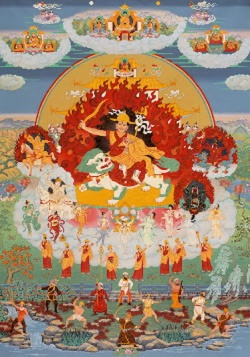Difference between revisions of "Sopadhi sesa"
(Created page with "{{DisplayImages|{{Random number}}}} Sopadhi sesa nibbana This is Nibbana, which is also called Nibbana with corporal remainder (sopadhi-sesa-nibbana). The...") |
|||
| Line 5: | Line 5: | ||
[[Sopadhi sesa nibbana]] | [[Sopadhi sesa nibbana]] | ||
| − | This is [[Nibbana]], which is also called [[Nibbana]] with corporal remainder (sopadhi-sesa-nibbana). | + | This is [[Nibbana]], which is also called [[Nibbana]] with corporal remainder ([[sopadhi-sesa-nibbana]]). |
| − | The meaning of [[Nibbana]] is [[perfect peace]] or | + | The meaning of [[Nibbana]] is [[perfect peace]] or [[tranquility]], or an eternally [[happy]] and [[joyous state]] in which [[wisdom]], [[happiness]] and [[virtue]] are perfectly achieved. |
[[Buddhists]] view such a sate as only attainable by {{Wiki|holy}} ones, thus can not be judged by [[experienced]] conceptions like [[existence]], [[non-existence]], coming and going etc. | [[Buddhists]] view such a sate as only attainable by {{Wiki|holy}} ones, thus can not be judged by [[experienced]] conceptions like [[existence]], [[non-existence]], coming and going etc. | ||
| − | It is an [[inconceivable | + | It is an [[inconceivable state emancipation]]. |
As I mentioned above, [[Nibbana]] can be interpreted as passing away. | As I mentioned above, [[Nibbana]] can be interpreted as passing away. | ||
Latest revision as of 16:50, 24 August 2018
This is Nibbana, which is also called Nibbana with corporal remainder (sopadhi-sesa-nibbana).
The meaning of Nibbana is perfect peace or tranquility, or an eternally happy and joyous state in which wisdom, happiness and virtue are perfectly achieved.
Buddhists view such a sate as only attainable by holy ones, thus can not be judged by experienced conceptions like existence, non-existence, coming and going etc.
It is an inconceivable state emancipation.
As I mentioned above, Nibbana can be interpreted as passing away.
Actually, Sakyamuni attained Nibbana and became a Buddha at the age of 30, yet his corporal body remained as the residual fruit of his former illusion and kamma.
This is Nibbana with remainder (sopadhi-sesa-nibbana).
It was not until his death at the age of 80, that he entered Nibbana without remainder (Nirupadhi-sesa-nibbana).
